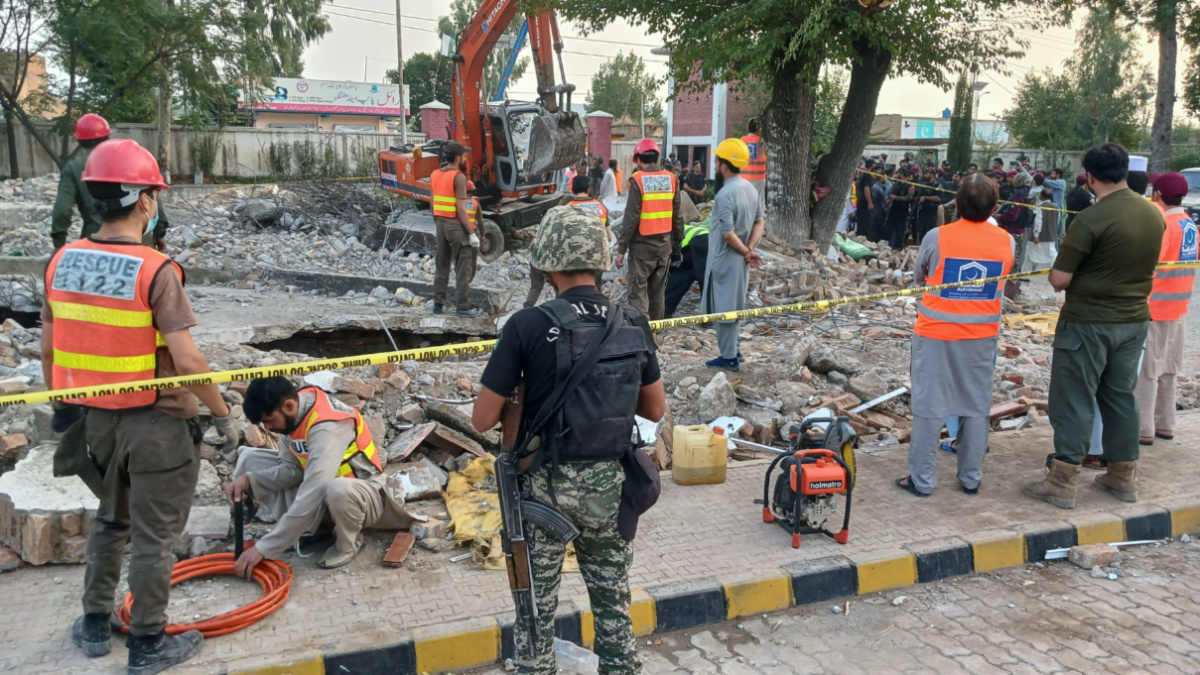
ELLIS HEASLEY, of UK-based religious freedom advocacy CSW, says Pakistan must stop passing laws “clearly designed to appeal to Pakistan’s Muslim majority” in order to tackle the nation’s terrorism crisis…
London, UK
Last month, as Muslims gathered to celebrate the birthday of the Prophet Muhammad, terror struck Pakistan as it has done so often throughout 2023.
On 29th September, at least 54 people were killed when a suicide bomber targeted a religious procession in the town of Mastung in Pakistan’s northern Balochistan province. On the same day, at least five others were killed in a blast inside a mosque in Hangu in Khyber Pakhtunkhwa.

Rescue workers clear the rubble from a damaged mosque, after a suicide blast in Hangu, Pakistan, on 29th September, 2023. PICTURE: Reuters/Stringer
Even the country’s Muslim majority is not safe as the Pakistani Government’s continuing failure to respond adequately to terrorist threats in the country – and indeed its frequent embrace of hardline Islamism – has a devastating impact on Pakistanis of all religious and belief backgrounds.
Many of the terrorist attacks in the country have targeted soldiers and police officers – as was the case when at least 17 people were killed in two explosions at a counter-terrorism ammunition depot in Swat valley in April – however the Pakistani think-tank Center for Research and Security Studies has documented 333 civilian fatalities in the first nine months of 2023, which is already an increase on 308 from the entirety of 2022 before it.
“Even the country’s Muslim majority is not safe as the Pakistani Government’s continuing failure to respond adequately to terrorist threats in the country – and indeed its frequent embrace of hardline Islamism – has a devastating impact on Pakistanis of all religious and belief backgrounds.”
Admittedly, this is a marked improvement on when the number stood at over 3,000 in 2013, but the return to an upwards trend is alarming and the government must act swiftly to contain it.
That means it must stop passing laws that are clearly designed to appeal to Pakistan’s Muslim majority, like the Criminal Laws (Amendment) Act 2023 which makes the country’s already controversial blasphemy laws far more stringent.
The Act was passed in Pakistan’s Senate on 7th August, and it increases the punishment for insulting the Prophet Muhammad’s companions, wives, and family members from three years to life imprisonment, with a minimum sentence of ten years.
Barely a week later, Pakistan was presented with yet another reminder of how easily these laws can be misused, and of the mass violence they can trigger against minority communities, when 21 churches and hundreds of Christian homes were burnt down in Jaranwala city in Punjab Province after two Christians were accused of desecrating the Quran in what has since been found to have stemmed from a personal grudge.
Local mobs were seen raising slogans in favour of extremist organisations like the Tehreek-e-Labbaik and Khatam-e-Nabuwat, and calling for the execution of both of accused.
Christians in the area continue to live in fear, particularly as the Punjab government recently withdrew its decision to form a joint investigation team to look into the violence. It is likely that justice will remain elusive for this community, as it has done for so many others in Pakistan’s history; meanwhile, those who took matters into their own hands in Jaranwala will no doubt feel emboldened to do so again.
It is also far from clear who is responsible for the terrorist attacks on the Muslim gatherings last month. At the time of writing, no group has claimed responsibility for either attack. The Pakistani Taliban, known as Tehreek-e-Taliban (TTP), has denied any involvement, claiming that they do not target mosques, seminaries, schools or public gathering. Yet a TTP faction claimed responsibility for January, 2023, bombing of a mosque in Peshawar that killed at least 100 people, and the twin suicide bombing of All Saints Church just over a decade ago remains the deadliest attack on Christians in the history of Pakistan.
No religious or belief community is safe until those responsible for horrific terrorist attacks and blasphemy-related communal violence are routinely held to account in Pakistan. For its part, the government must cease propagating any narratives that equate Pakistani and Islamic identities.
Please pray that this happens swiftly, asking the God who ‘deposes kings and raises up others’ (Daniel 2:21) to elevate just and wise leaders in Pakistan today.

Ellis Heasley is public affairs officer at UK-based religious freedom advocacy CSW.






